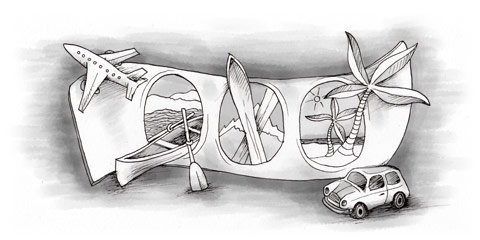Fly-drive deals are available through most airlines and travel agencies. French railways (SNCF) offer inclusive train and car rental deals, and their France Vacances Pass includes car rental. You can rent an Avis car from 196 SNCF stations and leave it at any station operating the Train + auto scheme (leaflets are available at SNCF stations and include a map of participating stations).
Car rental in France is expensive, particularly for short periods, although rates have fallen in recent years. Prices, which include VAT ( TVA) at 19.6 per cent, can vary widely from one company to another, so it pays to shop around, although rates also vary according to your age and the number of years you’ve been driving. Rates normally include 100km ‘free’ (above 100km you pay around €0.50 per km).
Reduced rates are available for weekends, usually from 12.00 on Friday to 09.00 on Monday, and rates fall considerably over longer periods. There may, however, be a large excess ( franchise), e.g. €2,500, and you may be charged extra for collision damage waiver (CDW), which reduces or cancels the excess. (It’s possible to take out an annual insurance policy against having to pay an excess on rental cars for as little as €60, e.g. via Insurance 4 Car Hire, UK 020-7012 6300, www.insurance4carhire.com ).
Local rental companies are usually cheaper than the nationals, although cars must be returned to the pick-up point. Older cars can be hired from many garages at low rates. If required, check in advance that you’re permitted to take a car out of France (usually prohibited).
To hire a car you must be a minimum of 18 years old, although most companies have increased this to 21 or even 25, and most companies have an upper age limit of 60 or 65. Drivers must have held a full licence for at least a year. International companies require payment by credit card, although local firms may allow you to pay a cash deposit of €150 to €300 (or the whole rental period may need to be paid in advance). You may also need to produce a residence permit and other identification. If you’re driving a rented foreign-registered vehicle, you should ask the rental company for a ‘hired/leased vehicle certificate’.
Optional extras include a portable telephone, luggage rack, snow chains and child seats. Instead of a standard car, you can hire a 4-wheel drive car, estate car, minibus, luxury car or convertible, possibly with a choice of manual or automatic gearbox. Minibuses accessible to wheelchairs can also be hired, e.g. from Hertz. Vans and pick-ups are available by the hour, half-day or day.
Cars can be rented in France through major international rental companies such as Alamo (www.alamo.com ), Avis (www.avis.com ), Budget
(www.budget.com ) and Hertz (www.hertz.com ) by booking through their US offices and paying by credit card. This is a legitimate practice and can save 50 per cent or more on local hire rates. Telephone numbers of other US-based rental companies can be obtained from international directory enquiries, although you may not be able to access toll-free (800) numbers.
This article is an extract from Living and working in France. Click here to get a copy now.


